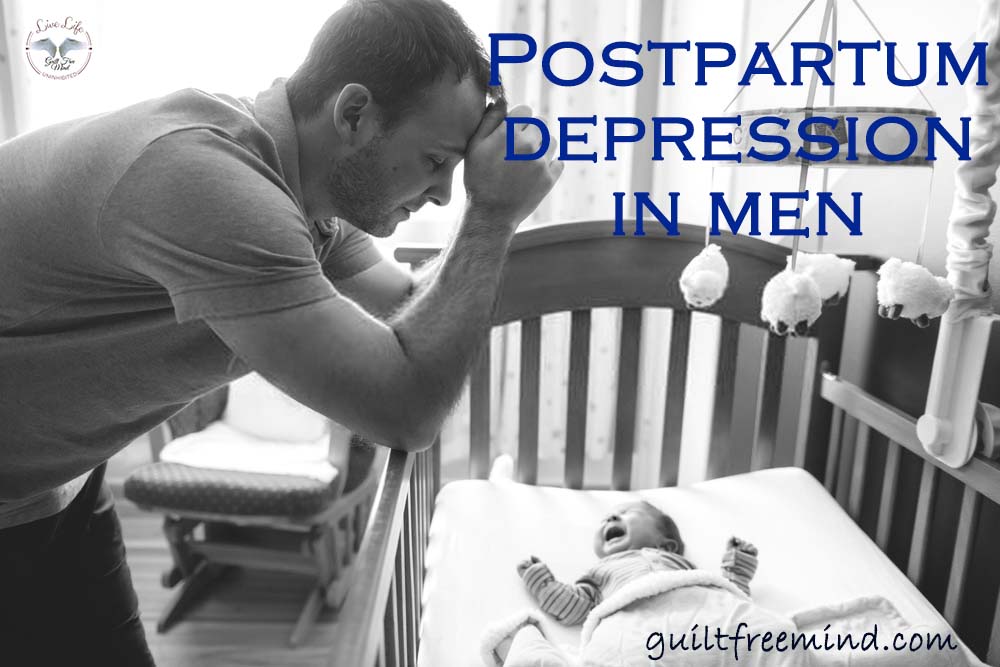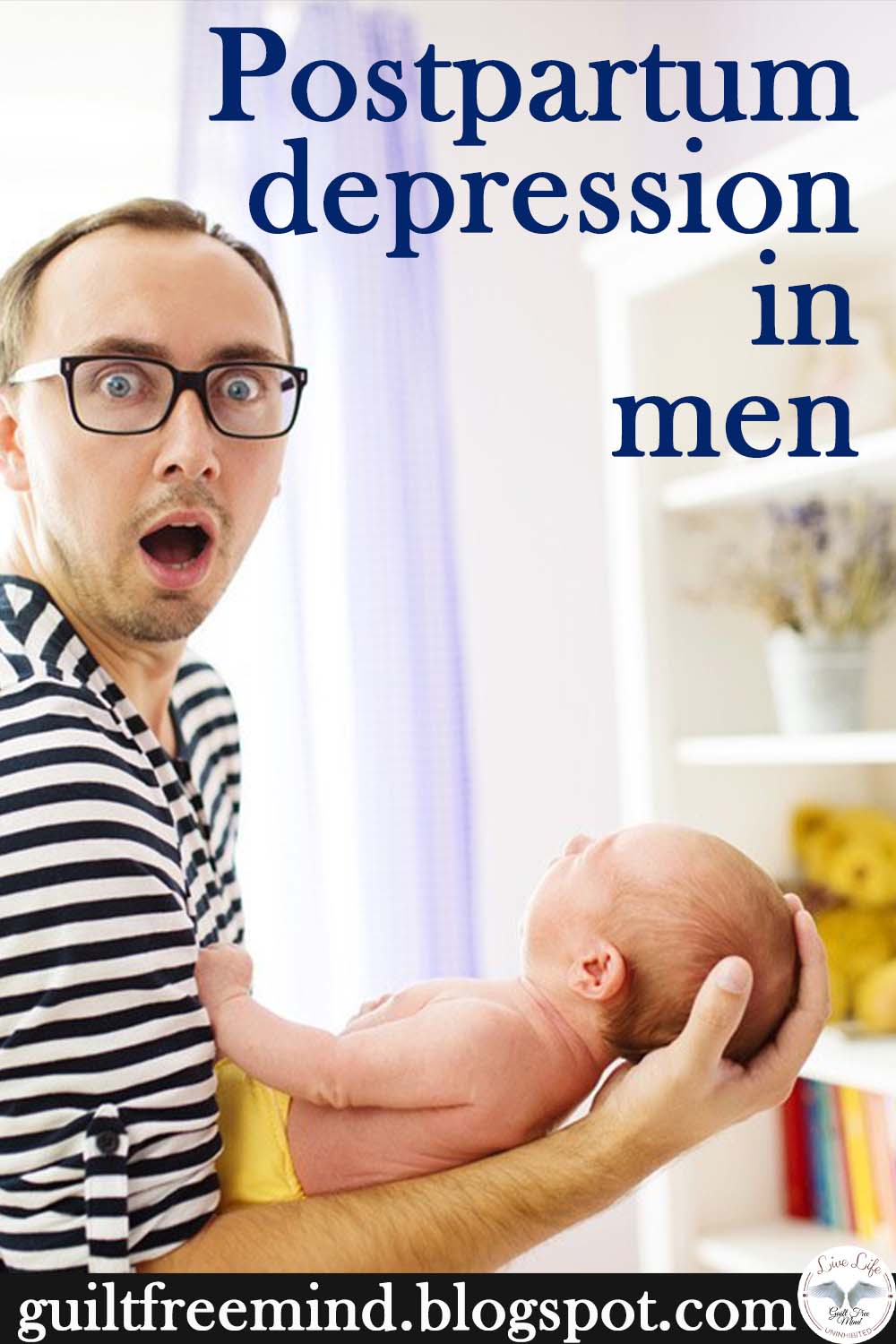If you would like to have regular mental health tips delivered to your inbox, please subscribe to the blog.
 |
| Pin the article for later |
What is postpartum depression?
Postpartum depression is described as an episode in the spectrum of major depressive disorder (MDD). This occurs in the father once the child is born. Most often, postpartum depression is reported in the case of mothers, but it can also affect fathers.
Postpartum depression for men
So far there are no established criteria for the diagnosis of postpartum depression in males. The unfortunate part of this is that there is not a lot of awareness regarding postpartum depression for men because it has not been as commonly observed as postpartum depression in women. Most often, this condition goes undiagnosed and untreated.
According to surveys, around 25% of first-time fathers suffer from postpartum depression. However, only 10% of postpartum depression in males gets recorded. In the case of men, this condition is referred to as parental postnatal depression (PPND) or parental postpartum depression (PPPD).
If you are worried that you or your loved one might be suffering from parental postpartum depression, this blog post is for you. Read on all the way till the end to know the symptoms and treatment options available for postpartum depression in males. Your knowledge might help make someone’s mental health better.
Symptoms of postpartum depression for men
The first step in understanding postpartum depression for men is to understand the symptoms of the problem. It is imperative that you understand the difference between the symptoms of postpartum depression in males and daddy blues.
Daddy blues is a very common occurrence amongst new fathers. It is understandable that new fathers will feel overwhelmed, stressed or tired. However, the symptoms of daddy blues tend to go away within a period of a few days once the new dad is able to make time for himself, visit friends, or indulge in some exercise.
However, postpartum depression in males is much more severe and lasts for a very long duration. This problem does not go away by a change of scenery or meeting friends.
Symptoms of postpartum depression for men
Here are a few common symptoms of postpartum depression in males:
- Social withdrawal
- Focusing more on work or other sorts of distractions
- Low energy levels
- Constant tiredness and fatigue
- Substance abuse and alcoholism
- Changes in weight, appetite as well as sleep
- Constantly feeling unmotivated
- Stomach aches and headaches
- Easily getting frustrated or stressed
- Aggressive or violent behavior
- Risky and impulsive behavior
- Irritability and short-tempered
The symptoms of postpartum depression for men can start at any point during the first year of the child.
 |
| Postpartum depression for men |
Risk factors that contribute to postpartum depression in males
Risk factors that contribute to postpartum depression for men include
- Hormonal changes
- High-stress lifestyle including family and career
- A tense relationship with the spouse
- Poor relationship with the in-laws
- A continuous lack of sleep
- Lack of support from his parents
- Financial stress
- Being a part of a non-standard type of family for example stepfathers or unmarried men
- A history of depression
- Feeling left out from the bond between the child and the mother
However, the biggest risk factor which contributes to postpartum depression in men is the mother suffering from postpartum depression. It has been observed that 50% of men who have their spouse battling postpartum depression will start to feel depressed as well
Diagnosis of postpartum depression for men
Even though society encourages men to discuss their feelings, Men still have a difficult time discussing their problems. Difficulty to discuss the symptoms of postpartum depression for men especially arises if the mother is also suffering from postpartum depression.
In such cases, men hide their feelings to reduce the stress on their better half. A lot of men also feel confused and ashamed due to their postpartum depression symptoms. Thus they feel reluctant to get medical help.
It is hard to diagnose postpartum depression for men. However, achieving a diagnosis and getting help is very critical for the relationship between the partners as well as for the future of the child.
Related posts:
Pin it!
 |
| Pin this article for later |
Treatment of postpartum depression for men
The first step to solving a problem is acknowledging that there is one. A lot of men who suffer from postpartum depression will not actively seek help. Asking for help is the first step in reaching towards better mental health. Men should understand that the way they are feeling after the birth of the child is not normal. The birth of a child leads to a huge lifestyle change And can bring along a lot of emotional changes as well.
Just as in the case of women, men suffering from postpartum depression are prescribed medications like antidepressants. Alternate therapy like counseling, support groups, etc is also available for exploration.
There are a lot of postpartum depression support groups available which specifically cater to men. These groups are a great way to discuss one’s experiences and talk about their worries and concerns and feel understood by others who are also in the same predicament. Alternatively, you can go for postpartum support groups for couples or family-oriented support groups to learn relationship and coping skills
Related post:
Self-help techniques for men suffering from postpartum depression
Self-help techniques not only help people suffering from postpartum depression, but it also helps in battling general anxiety, stress as well as depression:
A few examples of self-love activities include
Related posts:
Dream journaling in art therapy; looking beyond the mirrorA few examples of self-love activities include
- Eating healthy
- Getting adequate sleep
- Journalling
- Engaging in yoga
- Meditating
- Exercising every day
Conclusion
Postpartum depression can affect both men and women. The important thing to keep in mind is that men should be open about their feelings and communicate with your partner. In case there is a problem, it can be nipped at the bud in the initial stages itself.
Postpartum depression for men is a serious condition and should not be taken lightly. The good thing about this is that it is treatable. Along with professional help, you can go the extra mile by doing self-care activities. This will help you recover faster and secure the future of your mental health.
Some other articles you might be interested in:
How to leave a toxic relationship in 13 steps and be free
15 signs of anxiety disorder you must know about
See you in my next blog post
Shruti
Shruti



